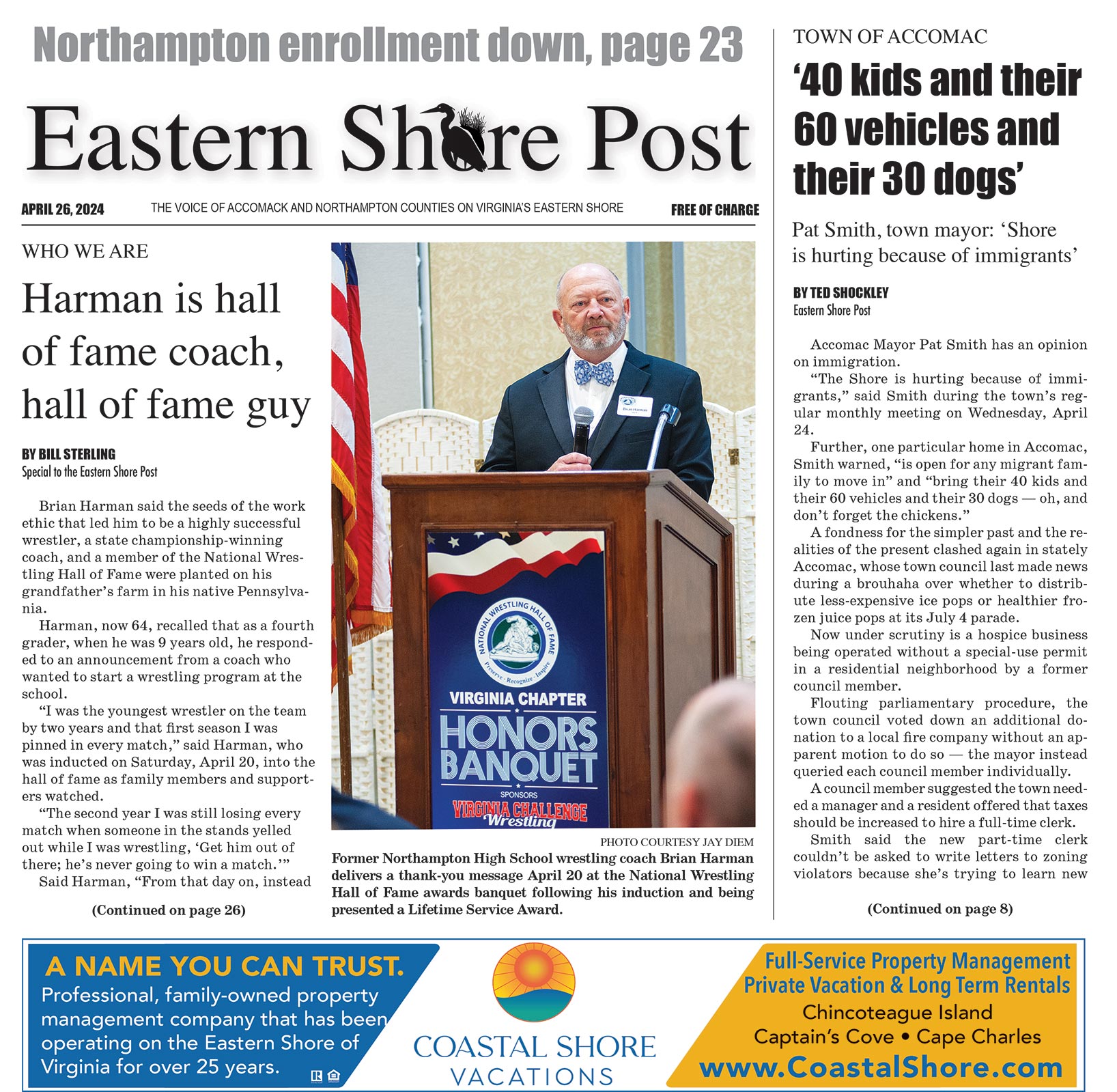By Carol Vaughn —
Onancock officials approved an infectious disease plan required under Virginia’s temporary emergency standard for workplace safety in the COVID-19 pandemic.
The standard went into effect July 27 and Virginia employers are required to do related employee training by Aug. 27, or by Sept. 25 for employers who because of employees’ higher risk level had to develop an infectious disease plan.
The town council voted 4-0 to approve the 16-page plan, which Town Manager Matt Spuck prepared using a template from the town’s insurance company and information from the Virginia Occupational Safety and Health program, with input from the personnel committee.
“As part of that standard we needed to do an evaluation of all of our staff,” to determine their risk level for exposure to the virus, Spuck said.
Because the town has a police department, whose employees are considered at higher risk for exposure, the town was required to develop and adopt a response plan.
The standard stays in effect for six months unless Gov. Ralph Northam suspends or extends it.
The emergency standard’s publication in a Richmond newspaper also constituted notice the Virginia Safety and Health Codes Board intends to adopt a permanent standard within six months.
Protocols — including daily temperature checks for employees, additional sanitizing, requirements for cleaning shared vehicles and tools, and wearing of face coverings in town buildings, among others — are part of the plan.
“Every employee has to be trained and it’s a dense training,” Spuck said.
Vice Mayor Bob Bloxom asked about enforcement of wearing face coverings for the public coming into town offices.
“We require masks to enter. If they come in without the masks, we are asking them to put masks on, but we are not going to physically remove anybody; we’re not going to involve the police department,” Spuck said, adding, “We’re honestly hoping that our residents are going to comply with those requirements.”
If they don’t, the town could have to restrict public access for employees’ safety, he said.
Bloxom asked whether employees have authority to speak out if they feel uncomfortable.
“That’s probably the key behind any of this. … Every employee has to be trained. … Once they are trained they would come to me or the mayor as the secondary health officer. … The most important thing that this policy protects is the safety and comfort of our employees,” Spuck said.
Additionally, the federal Family First Coronavirus Response Act requires the town to provide “up to 80 hours of what we are calling ‘COVID time,’” Spuck said, noting, “The first 80 hours are on us.”
According to the adopted plan, employees who should not report to work include anyone with COVID-19 symptoms as well as anyone who in the last 14 days has had close contact with someone with a confirmed diagnosis or who has symptoms, or who has traveled by airplane within the last 14 days.
More CARES Act Funds
Onancock is receiving a second round of federal funding by way of a share of Accomack County’s allotment, based on town population.
Spuck detailed for the council staff’s recommendation for how to use the $106,333, including:
Reserve $25,000 for 80 hours of paid sick leave for employees, required by the Family First Coronavirus Respond Act
$2,000 to purchase personal protective equipment for employees and to distribute to residents and businesses
$1,333 for thermometers and other materials for verifying employee safety
$8,000 for technology to improve remote work options
$40,000 for building improvements for employee and customer safety and for a potential distance learning location upstairs at the town hall for the school district and Eastern Shore Community College.
$30,000 for small business grants.
“That would mean…that we would have rebated to our businesses virtually 50% of all of the town monies” received through the CARES Act, according to Bloxom.
Officials likely will vote on the use of the funds at the next council meeting.
The council also approved a request from Fletcher and Janet Fosque to rezone 18 Market Street from downtown business to residential.
The council approved a resolution to transfer permanent maintenance of East Street to the state highway department. The town retains ownership of the street.
Spuck wrote and applied for a grant from the Virginia Department of Forestry to care for a signature tree in town that is in distress — the large white oak behind Roseland Theatre.
The $11,000 grant if awarded would help pay for a canopy cleaning, lightning protection, lower limb cabling, removal of asphalt around the tree, installation of a split-rail fence around it, and planting of clover beneath the tree.
The town should be notified within 45 days whether or not the grant is approved.



